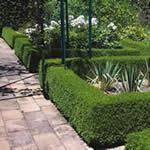Growing Hedges & Care Guide
Growing and Caring for Hedges
 Growing hedges is easy but the secret lies in selecting the hedge variety that suits your situation. If you pick the right variety then hedge care is reduced and it will perform well in your environment.
Growing hedges is easy but the secret lies in selecting the hedge variety that suits your situation. If you pick the right variety then hedge care is reduced and it will perform well in your environment.
Planting width: Varies depending on species – refer to individual variety details.
Planting depth: Plant hedge plants in soil at same level as in the pot.
Position: Full sun to part shade
Soil: Well drained soil that ensures roots do not become water-logged.
Watering: Regular deep watering in dry spring and summer conditions is required. Hedging plants like to be well watered, particularly while becoming established. A drip watering line is often a convenient means of watering a garden hedge.
Fertilising: Ensure that the soil is well dug and prepared with organic matter such as well-rotted animal manure, blood and bone or leaf mould. Mulch well to conserve water and keep roots cool.
Pruning: Prune regularly to avoid hedge looking bushy and straggly. Shaping and pruning may need to be done several times during the growing period to keep plants in shape and to train them (if using as topiary.) Any hard pruning should be done in late winter. Some species are good in tubs, formal and informal hedges, privacy screens and topiary. For an informal planting or specimen shrubs, trim lightly once or twice during the growing season to encourage compact growth.
Tips: When shaping your hedge, it is important that the finished item has a slight wedgeshape, with the top foliage slightly narrower than the lower foliage. This will enable all branches access to light, and will result in an overall healthier hedge with foliage all the way down to the ground level.
When buying new hedge plants to create a garden hedge, buy several extras and plant in suitable sized pots so that if one in the hedge doesn’t thrive, you can replace it with one of approximately the same size and type.
Some species are known to perform better in different climates and situations eg: Photinia dislikes humidity, Japanese Box tolerates more heat than the other Buxus varieties. Refer to the information in individual garden hedge varieties for suitability to your particular situation.






